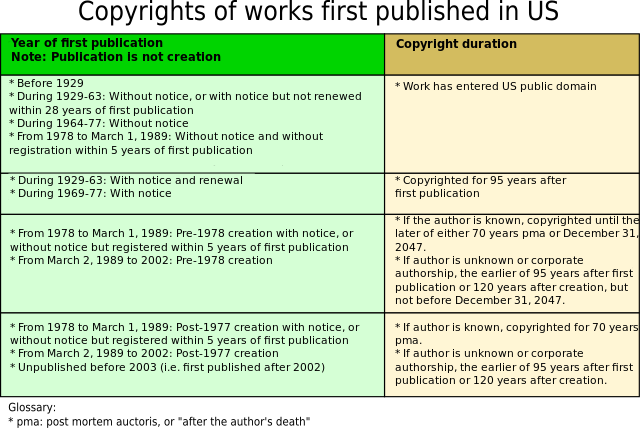
For the bibliophiles out there, I think I can relate with the fact that the publisher of the book we want to have matters, right? If you are asking me, I like my books published by Penguin Classics or Oxford World Classics since they provide great notes on the chapters, a well-detailed overview of the author and his/her works. When it comes to buying works that are translated from another language, it matters as well if the publisher is reputable. For musicians, the publisher of music scores definitely matters when trying to learn a new piece.
It is important to note that many of the pieces performed in the concert hall today are in the public domain, meaning that the copyright no longer exists. Now the copyright for a work of music depends on the IP laws of countries. In Canada, copyright in general lasts the author’s life +50 years. In the United States, it depends on various factors, of which I will attach a picture below:
Some music publishers have exclusive rights to the works of a composer before it enters the public domain —Samuel Barber’s works for example are published by Schirmer. The reason why there are many editions by many publishers for the works of Bach, Chopin, Liszt etc. is that their works are already in the public domain worldwide. IMSLP thankfully lays out which composers have works in the public domain and place notes if they are available in the United States or in the European Union to download and use. Companies like G. Henle Verlag, Bärenreiter Verlag have their editions of a composer’s works, and usually these works are already in the public domain.
When musicians buy the printed/online version of the music, there is much to consider about discrepancies on the part of the editor, printing mistakes, differences in dynamics etc. If you are a soloist, you only have to think of yourself here and pick the edition of the work you think is best for learning. Considerations include phrasing marks, dynamics, fingerings etc. However, for those learning chamber music or performing with an orchestra, everyone needs to have the same edition, lest one member of the ensemble screws up and realizes that the edition they have is different from the others. For those who cannot afford to purchase urtext editions (Editions that seek to be as close to the manuscript without any additional changes), IMSLP provides a variety of editions to choose and download and it is up to the preference of the musician for which to choose. The choice of edition lies as well —for some reason— with the nationality of the publisher and its relation to the composer. For example, I have the national edition (Wydanie Narodowe Dzieł Fryderyka Chopina) of Chopin’s works edited by Jan Ekier; this edition is used during the International Chopin Competition in Poland. For French works, I get Durand. I wish I can elaborate on this further.
Just like buying any other book, the edition matters. As things get updated over time to rectify past mistakes, so do editions of the music that seek to be as close as possible to the original manuscript.



